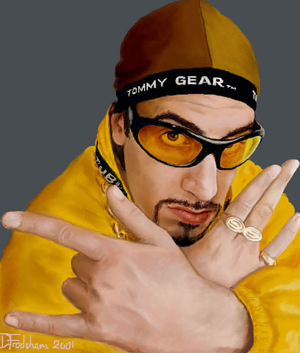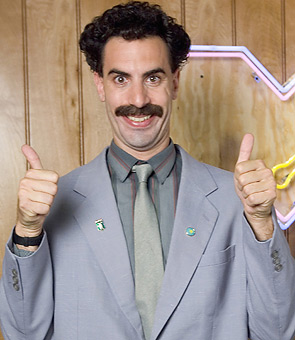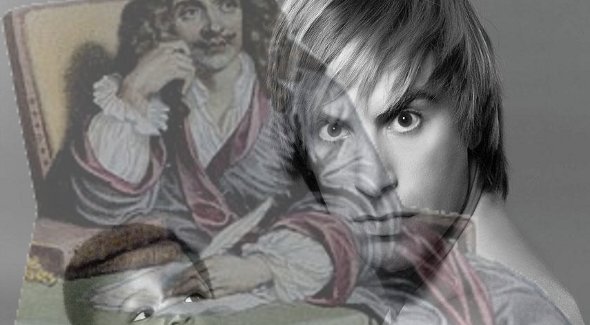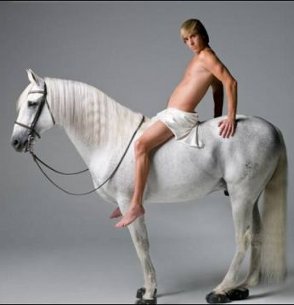Here are three potential interpretations of Bruno I’ve been hearing recently (okay, four):
— Bruno is about surprising people into revealing ugly truths about themselves, like Borat
— Bruno is a piece of stunt cinema done for shock value, like Jackass
— Bruno is (alternatively) a shameless revel in queerbashing / a clever indictment of queerbashers
Its episodic structure plays into each of these thematic approaches at times. The visual style, format and pacing are pretty similar to Borat, and it has a lot of similar set pieces and gags. It has a lot of gay jokes of questionable kosherness. All true and welcome. But these all seemed subplots, side themes to me, not really the main thrust of the piece – not what it was about.
My gut impression, which thinking about it more has only confirmed, was that Bruno was a much older sort of comedy, a comedy that followed a self-obsessed symbol of vice through a society that didn’t necessarily deserve better, but which at least offered the comfort and amusement of being hilariously consistent. Bruno immediately reminded me of Moliere — the French writer who brought us such Top 40 hits as The Hypocrite, The Misanthrope and The Imaginary Invalid.
And in thinking about the comedy of Moliere, where it sits in the tradition of comedy, and where Bruno sits among today’s comedy offers us some insight on one of the questions I think needs to be asked a lot more critically of our cultural arbiters:
When we laugh at our vices and failures, why must we insist they be fixed, or even be fixable?
All Moliere’s comic heroes are blinded by self-love. Instead of learning to know themselves, and growing wiser, they love themselves uncritically and sink into vice, folly or melancholy madness. Like Panurge or Adolphe, they magnify their own importance in the general scheme of things, devalue those around them who do not agree with them, and remove reason from the public domain, turning it into an instrument whose only function is to justify private passion and designs. Having failed to understand themselves, Moliere’s fools also fail to understand the shape of the world they live in; their careers are a series of comic blunders and accidents which result from what Celimene calls ‘this great blindness which afflicts all of us with respect to ourselves.’
— Andrew Calder, from Moliere: The Theory and Practice of Comedy
 Sacha Baron Cohen’s big three Ali G Show characters are ironic in parallel ways. Ali G has lowbrow, low-status tunnel vision, which tests the highbrow, high-status tunnel vision of the people he interviews. Borat has prejudices based on where he is from, and he draws out the prejudices we have because of where we are from. In the show, Bruno is so superficial and obsessed with sex that he reveals the superficiality and sex obsession of others. (The line from Mark’s Alabama videos posted earlier this week: “Being gay is the new coolest thing!” is very telling and important to remember)
Sacha Baron Cohen’s big three Ali G Show characters are ironic in parallel ways. Ali G has lowbrow, low-status tunnel vision, which tests the highbrow, high-status tunnel vision of the people he interviews. Borat has prejudices based on where he is from, and he draws out the prejudices we have because of where we are from. In the show, Bruno is so superficial and obsessed with sex that he reveals the superficiality and sex obsession of others. (The line from Mark’s Alabama videos posted earlier this week: “Being gay is the new coolest thing!” is very telling and important to remember)
But Bruno in the movie is not a lot like Bruno in the show. Bruno in the movie isn’t just obsessed with being cool, or with his sexuality, he’s obsessed with himself. He doesn’t so much aspire to qualities or to draw them out of people as seek to fully realize himself and bring them along for the ride.
This makes him very different than Sacha Baron Cohen’s other characters. Bruno is more motivated in this movie, and he follows more of a straightforward (heh) narrative, than the other Ali G thoroughbreds ever do. Bruno doesn’t just behave in this way to get laughs or as an intellectual exercise, he has a grounded point of view and objective.
 And when he’s misbehaving, the scenes are much more often about him. Borat is about the reactions Borat gets from people. Bruno is about Bruno. It’s about his story, his sexuality, his identity, his ultimate failure to reform or reinvent himself after the loss of his Austrian television show, and why this is funny rather than sad. Nobody really cared whether Borat managed to kidnap Pamela Anderson (the whole idea is absurd in a different way than Celebrity Max Out! is) – the big question was whether Pamela Anderson staged it or not (she did).
And when he’s misbehaving, the scenes are much more often about him. Borat is about the reactions Borat gets from people. Bruno is about Bruno. It’s about his story, his sexuality, his identity, his ultimate failure to reform or reinvent himself after the loss of his Austrian television show, and why this is funny rather than sad. Nobody really cared whether Borat managed to kidnap Pamela Anderson (the whole idea is absurd in a different way than Celebrity Max Out! is) – the big question was whether Pamela Anderson staged it or not (she did).
Bruno is more scripted than of Borat, and my guess is that some of the antics that looked spontaneous were at least partially staged. But that’s fine, because most of the comedy in Bruno doesn’t really depend on the events coming as a surprise – because most of the reactions from people are totally reasonable and not embarrassing to them in the slightest. Does anyone doubt that a new solder who acts like Bruno would get yelled at? That Celebrity Max Out! would fail in focus groups? (I love how Celebrity Max Out! Is mostly just footage of Bruno dancing. It definitely reinforces his self-obsession. As does the moment where he dresses like Indiana Jones, or when he seems totally unperturbed by the fact that Harrison Ford more or less flips him off.)



I like this post a lot. It makes me want to see Bruno more than I did before. But I don’t know if I agree with it. Of course, what follows comes only from my having read a bunch of reviews, and NOT from seeing the movie, so take it with about a quarter-tablespoon of salt.
The master plot of the comedy is basically as follows:
(I got this from reading Erich Segal’s “The Death of Comedy,” although I don’t know if it’s his theory or just my half-baked response to his theory.)
1) Status quo
2) Protagonist transgresses against the status quo by trying to do something… anything.
3) Protagonist realizes that his/her (but usually his, alas, if we’re honest) goal is inappropriate, and restores the status quo
4) Protagonist gets some kind of prize – might be love, might be money, might be a giant rack of spare ribs. Sometimes, confusingly, it’s whatever he/she was violating the status quo in order to obtain.
So if you look at American Pie (a pretty formulaic comedy, right?) it goes
1) Everyone is a virgin
2) Everyone starts trying to have sex
3) Each of the characters, crucially, stops trying to have sex. They ALL do this, without exception.
4) Everyone gets a prize, in this case, sex.
Look at Dave, a much more formulaic example
1) Dave is not president
2) Dave becomes president
3) Dave realizes that he has got to stop being the president
4) Dave gets a prize, in this case, Sigourney Weaver
Even in something like Talladega Nights, which SEEMS to have a very different message,
1) Ricky Bobby wins all his races thanks to the efforts of his support staff
2) Ricky Bobby tries to go it alone, and fails
3) Ricky Bobby wins the final race thanks to the efforts of his support staff
4) Everyone goes off to Applebees to eat a giant rack of spare ribs
And wouldn’t Bruno fit this model perfectly well?
1) Bruno starts the movie gay and not famous
2) Bruno tries to become famous by not being gay anymore
3) Bruno accepts that being true to his gayness is more important than fame
4) ?? (At this point, my not having actually seen the movie gets in the way. Maybe gay makeouts are supposed to be their own reward.)
This is interesting because it forces you to accept as an axiom that gayness and fame are mutually exclusive. It’s doubly interesting because it establishes gayness (of a certain stereotypically flamboyant variety) as *part* of the status quo. But it doesn’t strike me as fundamentally different from the more mainstream comedies. To tie back in to Fenzel’s post a little more: is Bruno’s acceptance of his sexual identity NOT supposed to be redemptive?
@jordan
I wouldn’t use that master plot for all of comedy. Moliere’s comedies are a bit different and don’t have those kinds of endings.
But more importantly, while I’d understand why a reviewer would identify that as the plot of bruno (it helps assuage guilt over laughing at the gay jokes), the “not being gay” isn’t the point of the movie, and it isn’t introduced until late in the second act, at the earliest.
Also, being gay again isn’t bruno’s victory. His victory is getting on the news for causing a big civil disturbance.
The plot of Bruno is more like
1. Bruno’s life is disrupted when he is kicked off his TV show for his bad behavior.
2. Bruno tries various ways to get famous other than his bad behavior (being straight is just one of them. The others are acting in hollywood, making a sex tape, and being a philanthropist)
3. Bruno fails at all of them because, every time, he reverts to his bad behavior.
4. Bruno eventually gets on the news for his bad behavior, which he takes as a victory and proof he is famous again.
So in the end, the thing that is restored is not so much a positive status quo, but the ridiculous way the world tolerates the main character’s failures. The character doesn’t actually change at all during the story. The only thing that changes is his relationship to the world.
It’s sort of like your template, but has very different implications.
So, yeah, I’d add this rubric as an alternative
1. Protagonist exhibits a bad behavior that the world tolerates or rewards
2. Circumstances pressure the protagonist to give up the bad behavior
3. The protagonist essentially does not change in response to these pressures
4. The world rewards the protagonist by embracing him again
This only works with comedies that are fairly pessimistic about people’s ability to change and that think social norms are essentially ridiculous.
A good example of this would be the teen summer camp sex comedy, where the camp across the lake that is all proper must be defeated by the protagonist camp that is full of misfits. Comedies like this with balls don’t make their horndog protagonists into monogamists, they make the world reward them for being horndogs.
A great example is Police Academy. The status quo here is that the people becoming police officers are really not supposed to be police officers. They all have huge problems with their behavior. Does anybody believe Commandant Lassard is fit to run a real police academy? Of course not. He’s sympathetic, but he’s incompetent and probably has advanced dementia.
So, the plot is about the attempts to improve the police academy, and the solution is, no, having ridiculous incompetent cops is the way things are, and that’s not changing, so let’s all laugh about the crazy world we live in.
Mahoney’s own plot is a bit more conventional (the sequels are better examples than the original), but nobody watches Police Academy for Mahoney.
And for the triple post, I want to clarify that I think your template is 100% right for most comedies. That kind of comedy is ancient and conventional. And you identified the movies it applies to perfectly. And the template I offered is clearly a variation on it rather than a whole new structure. And you could probably build a big enough box to fit everything. But I think these differences in comic structure are there and are important for how different comedies function differently.
I don’t think Moliere-style comedies would work nearly as well if they weren’t juxtaposed against conventional ones. The expectations and norms need to be there if you’re going to satirize them.
and just to clarify your example of reform in regards to Borat. . .
“still does not make apologies for himself or go hug a Jew at the end of the film.”(original text)
Borat’s story line is that he is a kazakastani reporter trying to learn more about america, and it slowly evolves into him finding a wife. the anti-sematism is just an example of this ass-backwardsness(not a bruno reference)
keeping with the fenzelian formula, the movie goes like this
1.Borat goes from a old world village to modern american life
2.His old world ways are shocking and non-sequitur
3.through trial, tribulation, and naked wrestling he learns the god fearin’ MERICAN way
4.Borat’s village recieves culture “we christian now!”(tongue in cheek)
his resolution is much more big picture than him hugging a jew,not negating your premise at all but fitting it to the formula a little tighter.
riveting article, cheers!
I was just so disctracted by the lack of coherence in Bruno its hard for me to embrace it. I feel the Borat had a plot and structure that both worked and supported the mockumentary feel of the film. He was sent to research America, but has his own side agendas, and so he’s followed by a film crew.
In Bruno is simply doesn’t make sense that he’s being followed by a film crew, there is no plausible basis for that within the plot of the film. He’s fired and friendless except for his personal assistant, so who is filming him?
Bruno is just so randomly thrown together, nothing seemed to have anything to do with what came before or after it. No I want a baby, no I’m hunting, no I’m wrestling. I also prefer the look and attitude of Bruno on the show over the one in the movie, he looks and acts more like what I’d imagine a Austrian fashion reporter to be like than the too silly movie version.